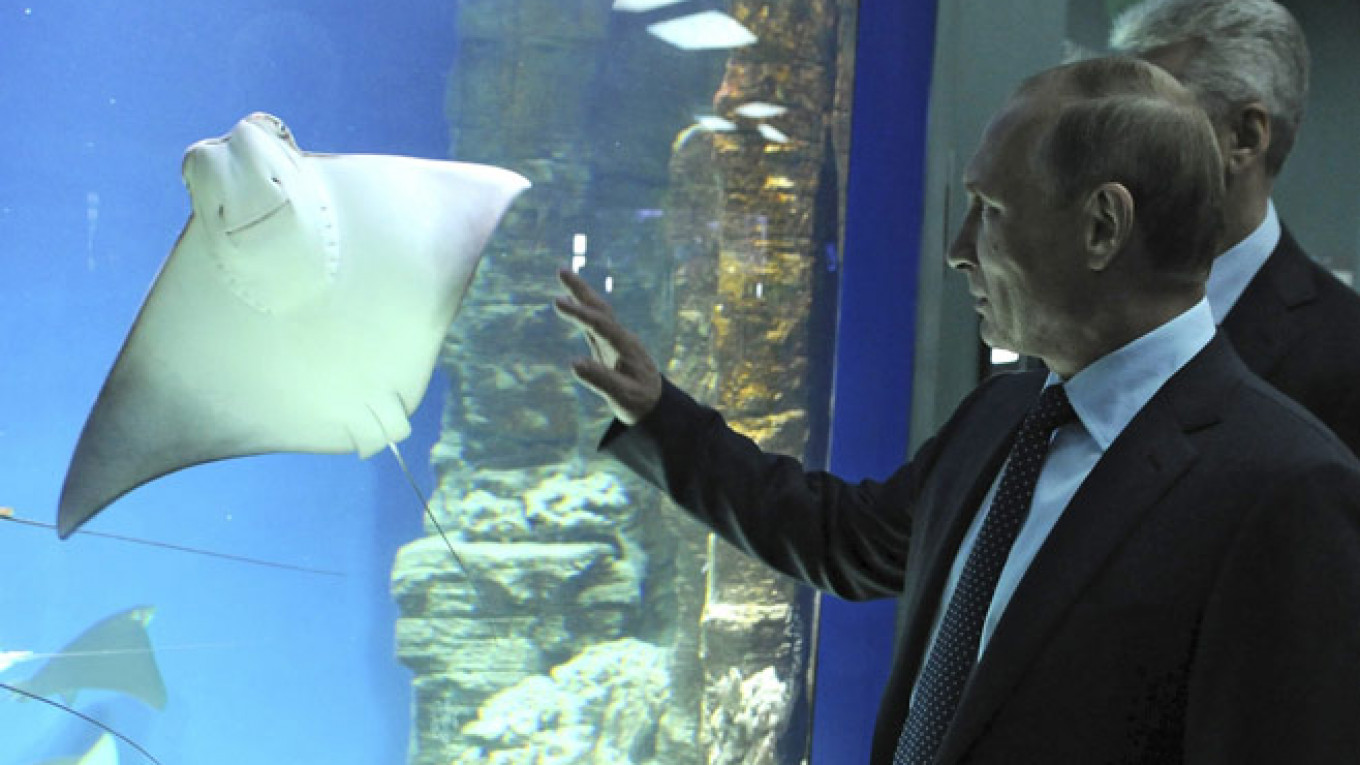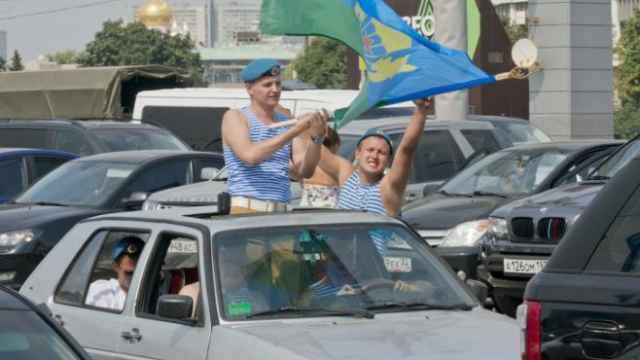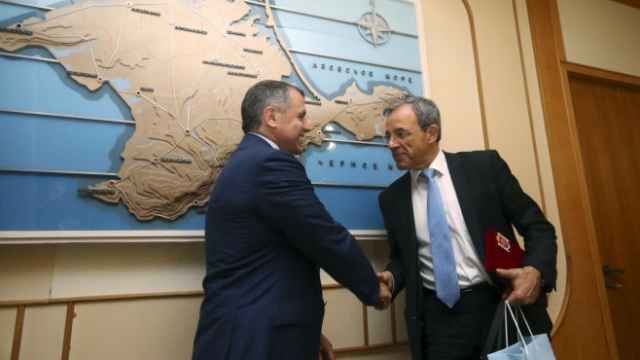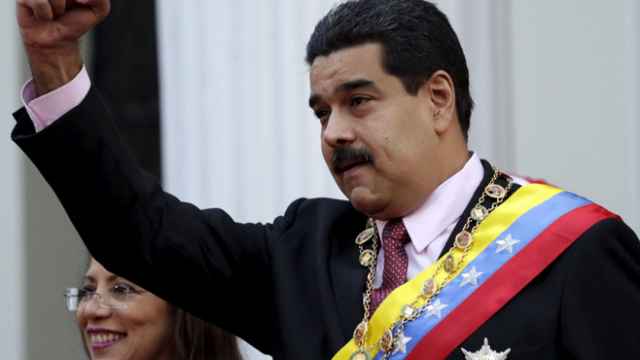Amid this week's dismemberments and bus crashes, the news about the presidential spokesman's wristwatch stood out. Dmitry Peskov married figure skating legend Tatyana Navka at a posh ceremony in Sochi, where he was seen sporting a Richard Mille RM 52-01 watch, worth four times his annual salary.
Peskov said the watch was a wedding gift from the bride — though he first donned it months before the wedding, and she is unlikely to have made this much money during her entire career. In any case, no corruption probes followed.
And indeed, corruption allegations against the Kremlin men and women are a dime a dozen, but Peskov is just a spokesman; what would he embezzle? He runs no oil ministries, procures no fighter jets, he just speaks on behalf of the president.
Of course, in the Byzantine and Chinese empires, court favorites and emperor's eunuchs could possess great powers simply because they controlled access to the ruler. But the basileis and the "sons of heaven" never had a press spokesman — and if they did, he would have been dressed in the finest gold-embroidered silks and bedecked with rubies and diamonds. All Peskov did was put on a wristwatch; if that's not modesty (by imperial standards), I don't know what is — so get off his case.
The Smuggling Wars
Another big news item this week was, of course, food burning. Ever since President Vladimir Putin banned certain Western foodstuffs, the evil Westerners have been trying to defy him and smuggle in Iberian ham, gorgonzola and dairy products that don't contain palm oil. The contraband was returned to the smugglers on interception but that only fueled their insolence. Mobile crematoria are already offering their services, though burning in the squares would, of course, be a better idea.
In a seemingly unrelated incident, border guards intercepted unusual outgoing contraband — someone tried to smuggle a T-34 tank out of Russia and into Kazakhstan by train. The tank, admittedly, was not battle ready, but still, more insolence. The tank's future remains unclear, but those mobile crematoria need something to incinerate — so expect more burning.
These two incidents shed light on the greatest mystery of our time — what is happening in Ukraine. Clearly, some savvy businessmen were smuggling Russian tanks in, and the local border guards tried to burn them in situ — and then things kind of snowballed. That is all — no invasions, no insurrections, just a misunderstood counter-smuggling operation. Once they figure it out, Russian and Ukrainian border guards will unite forces, burn all tanks and spread peace and goodwill all over the Donbass.
And if you think this is illogical — well, it's no more illogical than burning food in a country where 16 percent of the population lives below the poverty line.
Mummy in the Attic
In southern Russia, police found a mummy. Even better, the police owned a mummy — the dried-out corpse of an unidentified male was discovered in the attic of a local police precinct, where it apparently spent 40 years before word got out and its peace was disturbed. The Investigative Committee is looking into the incident and police have already said they don't even know the guy.
And you thought you had some skeletons in your closet.
But seriously, it makes perfect sense: Everybody keeps a little bit of what they work with. For the border guards, it's jamon and gorgonzola. (You can't really believe that they don't take a slice from a chunk of forbidden ham before burning the rest?); for the presidential spokesman, it's wristwatches (he has a collection), because he is a man for whom time matters; and for police, it's dead bodies. You never know when you may need one.
Some 50,000 Russians disappear without a trace every year. They may have been eaten by bears, abducted by aliens or simply moved to Kamchatka to start a new life. But one wonders how many mummies and skeletons would come up in case of a shakedown of all police precincts nationwide. That's a lot of attics and closets.
The Big Nothing
As food burned and mummies slept, Putin popped over to the new Moscow aquarium. The killer whales are sure to have soothed his nerves, but the same cannot be said about the children that accompanied him. One of the little pests ignored the killer whales completely and surprised the president with the question, "What's happening in Ukraine?" to which the president said with a shrug, "Nothing."
And this is, really, the most shocking piece of news in a long while, because — what do you mean, nothing? For a year, the Kremlin and ordinary Russians alike forgot about their own country completely and traced every tiny development in Ukraine with attention usually reserved for astronauts watching an oncoming meteorite. Even little kids care now and all they get from Putin is an uninterested "nothing"?
The worst-case scenario is that the president does not really care and has nothing to say about Ukraine in the absence of his honeymooning spokesman. But perhaps not. Perhaps Ukraine is just not the lynchpin of Russian life anymore and something new is on the way.
Judging from all the burnings, book bans and opposition crackdowns, we'll like it even less than a bloody war and a questionable land grab. Stay tuned for the new season of the fascinating show that is Russian politics!
Unfair Observer is the pen name of a Russian journalist that The Moscow Times has invited to observe the most brain-dead weekly developments in Russia.
A Message from The Moscow Times:
Dear readers,
We are facing unprecedented challenges. Russia's Prosecutor General's Office has designated The Moscow Times as an "undesirable" organization, criminalizing our work and putting our staff at risk of prosecution. This follows our earlier unjust labeling as a "foreign agent."
These actions are direct attempts to silence independent journalism in Russia. The authorities claim our work "discredits the decisions of the Russian leadership." We see things differently: we strive to provide accurate, unbiased reporting on Russia.
We, the journalists of The Moscow Times, refuse to be silenced. But to continue our work, we need your help.
Your support, no matter how small, makes a world of difference. If you can, please support us monthly starting from just $2. It's quick to set up, and every contribution makes a significant impact.
By supporting The Moscow Times, you're defending open, independent journalism in the face of repression. Thank you for standing with us.
Remind me later.






